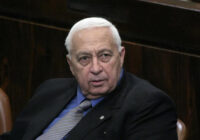Josef Olmert looks back at the life of one of Israel’s most important leaders.
A famous Zionist poet, Saul Tschernichovsky (1875-1943), wrote in one of his songs that “the human being is a reflection of his childhood landscape.” If there was one Israeli leader of recent time whose life story fits this observation, it was Ariel Sharon.
Sharon was the last Israeli leader whose childhood was molded in the years preceding the establishment of the state, and as such he was a product of the days of struggle for the small Jewish population in Eretz Israel.
For him, the struggle was an everyday life experience, something which he witnessed first-hand. Sharon never accepted the state and its existence and survivability as a foregone conclusion, rather as a precious treasure deposited in the hands of his generation to fight for, to preserve and to always be on the guard of.
Add the particular circumstances of his own immediate family, the poverty of early days in Mandatory Palestine, and you get the inevitable characteristic of toughness, suspicion and constant vigil.
This was also the case because the land was torn by a bloody, existential conflict between Jews and Arabs, which took place just a few years after the tremendous catastrophe of the Holocaust of European Jewry. The young Ariel Sharon knew that Jews needed to fight in order to survive, and fighting was indeed the essence of his life.
In a country like that, tragedies happen alongside victories, joy alongside sorrow, and achievements of major proportions alongside colossal mistakes and failures. There cannot be a collective clean sheet of success only and there cannot be a personal clean sheet of only successes either — and so it was the case with Ariel Sharon.
Great Achievements and Victories, Great Mistakes and Failures
Sharon, therefore, does belong to the group of great Israeli leaders — not only due to his successes but also due to his failures. Everything about him was grandiose, even though the exact circumstances of his death may be seen as if they present the opposite of all that, as the great man, known for his relentless drive, was in a coma for eight full years. As if he needed to rest after such an eventful life.
It was towards the end of the second week of the Yom Kippur War in 1973, when Sharon commanded one of the greatest ever operations of the Israel Defense Forces (IDF), crossing the Suez Canal.
After intense fighting which he led in front of his soldiers, not from the rear, Sharon managed to change the entire dynamic of that conflict and create the conditions which enabled Israel to salvage itself militarily. Perhaps more importantly, it allowed Israel to recapture its self-confidence and feel proud again of an army that seemed to be so disappointing until then.
Sharon was the man of the day, the man of many days to come. Very few people remember that it was the same Sharon — who was the commander of the southern front until a few months before the surprising Arab attack — who may have been partly responsible for the lack of preparedness on the day of judgment: October 6, 1973.
With his great prestige and aura of adulation, Sharon joined Israeli politics but not with the Labor Party, which may have been a natural choice for somebody like him who grew up in a socialist environment. Instead, it was with the right-wing. Sharon was the man who united various right-wing and nationalist factions into the Likud Party.
Yet on the night of the historic Likud election victory on May 17, 1977, Sharon was not on the side of newly elected Prime Minister Menachem Begin, basking in the limelight and sharing the glory. Because Sharon, being Sharon, fell out with Begin, established his own little faction, ran separately and was barely elected.
Within days, however, the retired general rejoined Likud, accepted Begin’s leadership and waited for another day of greatness to come. And it did.
Sharon as Defense Minister
Following the tumultuous 1981 elections, Begin nominated Sharon to be his defense minister, after which he was in charge of two momentous events. One was to be his role as the destroyer of Jewish settlements in the Sinai, part of the peace treaty with Egypt. The second was to lead Israel into the controversial Lebanese War in 1982.
The former job was not supposed to be Sharon’s, ever the advocate of Jewish settlement all over Eretz Israel. However, Sharon, while being a great supporter of settlements, was also a great pragmatist.
He lacked deep ideological convictions and a lot of his actions were motivated and initiated by sheer instinct. It should be emphasized, however, that Sharon’s instincts were almost always on the hawkish side of things, always preferring the strong-arm response over the softer, diplomatic one — clearly the outcome of years of struggle and trepidations along the road.
The forcible evacuation of Jewish settlers from Sinai earned him the everlasting, suspicious and reserved feelings in the ideological, religious right-wing of Israel. But it was the Lebanon War which turned out to be a seminal event in Sharon’s complicated career.
Sharon and the Lebanon War
Sharon wanted to destroy the Palestine Liberation Organization (PLO) in southern Lebanon, a goal almost unanimously supported by the Israeli public in 1981-2. He had Prime Minister Begin’s full, even enthusiastic, support as well as that of then-chief of staff, General Eitan.
It was never fully explained by Sharon whether the destruction of the PLO in Lebanon was an aim in itself, or part of a greater plan to later negotiate with the weakened Palestinian population in the West Bank and possibly Jordan about establishing some kind of Palestinian entity, or whether the defeat of the PLO was supposed to pave the way for Israel’s annexation of the West Bank and Gaza.
This lack of clarity seemed to be the main characteristic of the entire war, something which led many observers to believe that Sharon may have been a great tactician, a very able and charismatic field commander, but a bad strategist.
Alongside the destruction of the PLO, Sharon wanted to create a new political regime in Lebanon, led by the “young Turks” of the Christian Maronite camp, commanded by Bashir Jumayyil. He also wanted to terminate Syrian influence over Lebanon and the physical military occupation of large parts of the country.
In sum, he wanted to swallow much more than what Israel could possibly digest. In the process, Sharon ignored the complicated Lebanese reality out of a lack of understanding and a sense of hubris, disregarded the emerging Shi’ite power of Amal and Hezbollah and, on top of all that, he did not properly understand the depth of Syria’s commitment to have a decisive say in Lebanon.
So, it was this war which so blatantly, and less complimentary, put on display the two sides of Sharon: the ability to score a success in the battlefield, while losing politically and strategically.
The initial goal, removing the PLO, was achieved, and Sharon could celebrate his great victory. However, he wanted more, much more, but his wishes were thwarted. The Lebanese situation proved untenable, unwinnable for him and for Israel.
The breaking point was the terrible massacre committed by Sharon’s allies, the Phalangists, against defenseless Palestinians in the camps of Sabra and Shatila. Sharon was right in arguing that Christians, not Jews, had killed Muslims — surely not the IDF. But this was typical of Sharon, it was tactical.
Strategically, it was a major debacle — politically and morally for Israel as well. Sharon should have known and understood better, but he didn’t.
The fact of the matter was that the chief perpetrator of the massacre, Elie Hubayka, was a Syrian agent. Hubayka was later eliminated as part of the inter-Christian feuds in Lebanon. The whole situation came to be known in Israel as the Lebanese quagmire, and Sharon was held responsible by the majority of public opinion and most damagingly to him by the Kahan Commission of Inquiry in 1983. Sharon was in political exile, in disgrace for some years, but he later returned.
He became the minister of agriculture, a position he held until 1992, but in effect, Sharon was the minister in charge of building new Jewish outposts and settlements. He was unauthorized to do so, but Sharon repeated the performance of Lebanon — a one-man operation showing disregard to procedures, government decisions, and all being enveloped with high words about the sanctity of Jewish settlements.
Sanctity? This was the same Sharon who uprooted the settlements in Sinai, the same Sharon who would do the same, just a few years later, in Gaza when he was prime minister.
Sharon’s Legacy
Here is where the judgment as to the merit and value of his actions is left to the readers and, at large, to the Israeli people. All is in the eye of the beholder, so I personally make my choice here and categorically state that uprooting the settlements in Gaza in 2005 was a tragic necessity but a necessity nevertheless.
Israel had to end its control over more than a million poor and bitter Palestinians in Gaza, even when I take into account the two mini wars between Israel and Hamas which followed this fateful decision.
The circumstances leading Sharon back to the forefront of Israeli politics are out of the scope of this particular article, but what is fact is that only one leader could do what Sharon did in 2005, and that was Sharon. Who else?
What Sharon demonstrated was an exemplary exercise of leadership, courage, accountability, and pragmatism. This was his last great act before becoming comatose for eight years.
With that in mind, I, for one, a critic of the Lebanese War, have to recognize him as one of the greatest ever leaders of Israel.
If only Israel now had somebody who could take the plunge and make the fateful decisions required about the West Bank, about Judea and Samaria.
There is no Sharon to do what maybe only he could do, and that has become his legacy, his greatest claim to fame: the ability to make such huge decisions and stand behind them.
I was never a soldier serving under Sharon, but I join so many others who salute him upon his final departure.
The views expressed in this article are the author’s own and do not necessarily reflect Fair Observer’s editorial policy.
Image: Copyright © Shutterstock. All Rights Reserved
Support Fair Observer
We rely on your support for our independence, diversity and quality.
For more than 10 years, Fair Observer has been free, fair and independent. No billionaire owns us, no advertisers control us. We are a reader-supported nonprofit. Unlike many other publications, we keep our content free for readers regardless of where they live or whether they can afford to pay. We have no paywalls and no ads.
In the post-truth era of fake news, echo chambers and filter bubbles, we publish a plurality of perspectives from around the world. Anyone can publish with us, but everyone goes through a rigorous editorial process. So, you get fact-checked, well-reasoned content instead of noise.
We publish 2,500+ voices from 90+ countries. We also conduct education and training programs
on subjects ranging from digital media and journalism to writing and critical thinking. This
doesn’t come cheap. Servers, editors, trainers and web developers cost
money.
Please consider supporting us on a regular basis as a recurring donor or a
sustaining member.
Will you support FO’s journalism?
We rely on your support for our independence, diversity and quality.







Comment